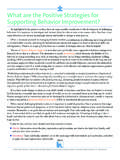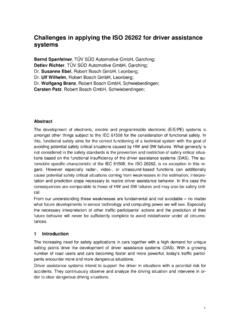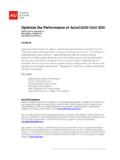Transcription of Behavioural Insights and New Approaches to Policy …
1 WORKSHOP23 January 2014, ParisCC9, OECD Conference CenterBehavioural Insights and New Approaches to Policy DesignProgrammeBEHAVIOURAL Insights AND NEW Approaches TO Policy DESIGN - WORKSHOP PROGRAMMEBEHAVIOURAL Insights AND NEW Approaches TO Policy DESIGN - WORKSHOP PROGRAMME12 Behavioural Insights and new Approaches to Policy DesignIntRODuCtIO n tO Behavioural In SI gHtS anD nEW POlIC y tOOlSThis session will explain the importance of the workshop for practical implementers and Policy makers. It will set out the current international trends on this topic and develop the rationale for new Approaches for Policy design and regulatory HalpernBehavioural Insights Team, UKRE gulatIng In tHE mODERn ECOnOmy nEW tOOlS fOR POlIC y OutCOmES This session will address the search of governments for what works and why. It will place Behavioural Approaches in the context of new Policy and delivery tools and discuss their advantages and disadvantages.
2 This session will investigate the current evidence of benefits and the costs of the methods inside and outside of governments. Moderator: David Halpern Behavioural Insights Team, UK Discussant: Katie Martin, Managing Director, madrianProfessor, Harvard Kennedy SchoolPablo marquez, Executive Director, Colombia Communications Regulatorfran oise WaintropSecr tariat G n ral de la Modernisation de l Ac-tion Publique, France Jonathan leigh Pemberton, Centre for Tax Policy and Administration, OECD Session - 11. 3 0 COffEE - REmaRKSW elcoming remarks to all participants to the workshop and the OECDA welcome coffee will be served at outside the alterDirector, Public Gover-nance and Territorial Development, OECD mari Kiviniemi OECD Deputy Secretary-GeneralmaIn StREamIng nEW tHInKIng IntO I nStItutIOnS This session will investigate the institutional arrangements of governments and regulators, such as through Behavioural economics units and initiatives in governments and regulatory agencies.
3 It will examine the political economy of introducing such an initiative and then also discuss the key ingredients for spreading a new way of thinking about old problems. Moderator: Owain Service, Managing Director, Behavioural Insights Team, UK Discussant: Odette van de Riet, Ministry of Infrastructure and Environment, - HeinonenState Secretary to Prime Minister, Finland Stefan HuntFinancial Conduct Authorit y, UKPete LunnThe Economic and Social Research Institute (PRICE Lab), IrelandEdwin LauReform of the Public Sector Division, OECD Session 2maCRO anD mICRO ImPaCtS Of aPPlyIng BEHavIO uRal ECOnOmICS? This session will discuss the possible scope and advantages of Behavioural Insights in regulatory design and delivery, as well as the potential untapped benefits of applying Behavioural methods to macro-level public Policy issues. It will discuss whether Behavioural Approaches can inform broader government strategies or if they are more appropriate for testing specific interventions for better outcomes.
4 Moderator: Dr. Pelle Hansen, Founder of inudgeyou, Chairman of Danish Nudge Network and Co-founder of The European Nudge Network, Denmark Discussant: Jean-Luc Schneider, Deputy Director, Policy Studies Branch, Economics Department, - tolson Revenue Commissioner, Mayor Office, City of Philadelphiayuval lasterDirector, Environmental Policy Division, Ministry of Environmental Protection, IsraelElke WeberProfessor, Columbia Business Schoolfranco SassiHealth Division, OECDS ession 3 Behavioural Insights AND NEW Approaches TO Policy DESIGN - WORKSHOP PROGRAMMEBEHAVIOURAL Insights AND NEW Approaches TO Policy DESIGN - WORKSHOP PROGRAMME34tHE StORy SO faR Of BEHavIO uRal Approaches anD nuDgIng Professor Cass Sunstein will discuss the progress to date and lessons learnt from implementing Behavioural Approaches internationally. This includes revisiting the premise behind applying nudges for governments (better regulation) and for citizens and business (time and money).
5 Questions: Katie Martin Followed by Q&A from - SunsteinProfessor, Harvard Law School (Via video conference)Katie martin Managing Director, ideas42 Session 5fROm nuDgIng tO tHE nExt Richard Thaler will share his views on the future for applying Behavioural Insights and the potential of Behavioural Approaches to influence public and economic Policy as well as the challenges in realising this potential. Questions: Faisal Naru Followed by Q&A from - thalerProfessor, Chicago Booth School of Business (Via video conference)faisal naruRegulatory Policy Division, OECDS ession 7 WayS anD mEtHODS fOR SuPPORtIng Behavioural InSI gHtS anD OtHER nEW Approaches tO ECOnOmIC CHallEngES? This session will discuss what support is required for Behavioural Insights and new Approaches practitioners to successfully deliver better policies and better outcomes.
6 This may include a discussion on the existing resources, networks and organisations and how they can assist practitioners. It will also include a discussion on the potential role of international bodies such as the OECD to support governments and regulators. Moderator: Luiz De Mello, Deputy Director, Public Governance and Territorial Development, OECD Discussant: Varun Gauri, Co-Director, World Development Report 2015, World - troussardHead of Unit Foresight and Behavioural Insights , European Commissionlee mcCauley Treasury, New Zealandmaya ShankarWhite House Social and Behavioural Sciences Team (via video conference)David v. y okumWhite House Social and Behavioural Sciences Team (via video conference)Session 4fInal WORDSF inal thoughts and comments will be provided on the discussions and outcomes of the meetings and any potential next - de melloDeputy Director, Public Governance and Territorial Development, OECDD avid HalpernBehavioural Insights Team, - 17.
7 3 0 COffEE BREaKmORE InfORmatIOn On Behavioural InSI gHtSBehavioural economics is the study of economic decision making and activity. Why do people make certain actions and how do they act in certain situations? This can range from the selection of product brands, to big decisions such as understanding why some people have health insurance, pensions and make health decisions. Understanding this behaviour can help governments and regulators design policies in such a way that citizens make better decisions and actions for the past five years, Behavioural economics has been rapidly propelled from the margins of economic Policy analysis towards the Policy mainstream. Its increased application is helping countries across the world to regulate better based on actual, and not assumed, POLICYThe use of Behavioural economics by governments and regulators is a growing trend globally, most notably in the United Kingdom and United States but more recently in Australia, Canada, Columbia, Denmark, Germany, Israel, Netherlands, New Zealand, Norway, Singapore, South Africa, Turkey and the European For more information please con-tact Faisal Naru, Senior Economic Advisor, OECD or Filippo Cavassini, Policy Research and Advice, OECD averyConsumer Policy Unit, Digital Economy Division, OECDBEHAVIOURAL Insights AND NEW Approaches TO Policy DESIGN - WORKSHOP PROGRAMMEBEHAVIOURAL Insights AND NEW Approaches TO Policy DESIGN - WORKSHOP PROGRAMME56who s who?
8 AVERY PEtER Peter Avery is Principal Administrator in the OECD s Directorate for Science, Technology and Industry, where he heads the Consumer Policy Unit. The Unit is responsible for carrying out research on a broad range of consumer issues, and for overseeing the development of consumer Policy guidelines in areas such as e-commerce, product safety, consumer education, cross-border fraud and dispute resolution. Recent projects have included the development of a Consumer Policy Toolkit, which examines how Behavioural economics could be used to improve the development and implementation of consumer MELLO LUIZ Luiz de Mello is Deputy Director of the Public Governance and Territorial Development Directorate at the OECD. Previously, he served as Deputy Chief of Staff of the OECD Secretary-General. He started his career at the OECD in the Economics Department, where he was the Head of Desk responsible for bilateral surveillance activities with Brazil, Chile and Indonesia before becoming the Economic Counsellor to the Chief Economist.
9 Mr. de Mello holds a PhD in Economics from the University of Kent, United Kingdom, where he started his career as a lecturer. GAURI VARUN Varun Gauri is Senior Economist with the Development Research Group of the World Bank and Co-Director of the World Development Report 2015: Mind, Society, and Behavior. His current research examines why public agencies comply with human rights court rulings and why individuals support public goods. He has BA from the University of Chicago and a PhD from Princeton University, and has held positions as Visiting Lecturer in Public and International Affairs at Princeton University and Visiting Professor in the Department of Economics at ILADES in Santiago, Chile.$HEINONEN OLLI-PEKKA Olli-Pekka Heinonen acts currently as a State Secretary at the Prime Minister s Office and is responsible for organising and leading the Prime Minister s Office. Before joining the Prime Minister s Office in March 2012, Mr Heinonen worked for 10 years as a Director in the Finnish Broadcasting Company.
10 Mr Heinonen has also been Minister of Transport and Communications (1999-2002) and Minister of Education (1994-1999). Mr Heinonen has also been a Member of the Parliament of Finland (1995-2002). Mr Heinonen has had a number of positions of trust serving the society in a wide scale. HUNt StEFAN Stefan Hunt runs the Retail and Behavioural Economics Team at the Financial Conduct Authority. The team advises on the application of Behavioural Insights and conducts economic research to support the Policy , competition and supervisory functions. Stefan has co-authored several FCA publications, including a practical framework for applying Behavioural Insights and the results of several randomised trials carried out in collaboration with regulated firms. He recently conducted analysis to set a price cap on payday loans, combining Behavioural Insights with data science and econometrics. HANSEN PELLE GULDBORG Pelle Guldborg Hansen is behavioral scientist, at Roskilde University.
















